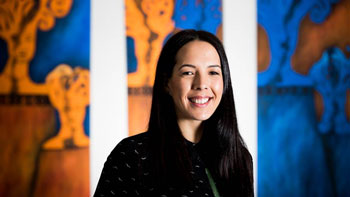The positive side of being Maori

Former Whanganui High School student Leigh-Marama McLachlan endorses Maori development through journalism.
Photo/ supplied.
Emma Russell continues her series charting the stories of former Whanganui students who have gone on to success in the big, wide world.
In a bid to endorse Māori culture in the media, former Whanganui Kokohuia student, Leigh-Marama McLachlan, pursued a career in broadcast journalism and landed a job with Radio New Zealand.
The 27-year-old said she was conscious of the type of stories told about Māori in that they were mostly negative, so she aimed to tell another side of being Māori.
And she worked hard to get there.
Before becoming a student at Whanganui High School, all of her schooling had been taught in te reo Māori at a small total immersion kura.
"I had to teach myself how to read English when I was about 8 and before high school I had had only a few formal English lessons," Ms McLachlan said.
Five years later she leaped from WHS head girl to a New Zealand Broadcasting student to Radio New Zealand broadcaster and now senior communications advisor at Te Puni Kōkiri (The Ministry for Māori Development).
But picking her chosen career wasn't as clear-cut as one might have hoped.
"I always had an idea that I would pursue something in the media but when I left school I didn't really know much about it," she said.
Ms McLachlan said she took a year off after finishing school and worked as a retail manager in Palmerston North.
"Having a year off was great for me. It gave me time to really think about what I wanted to do."
She applied to study at New Zealand Broadcasting School in Christchurch and initially didn't make the cut but two weeks before the course started she got a call and a spot was open for her.
"I had put all my eggs in this basket so I was pretty gutted when I didn't get in but that taught me a lot.
"Up until that point everything, to an extent, had seemed to go my way. It was really good to have that setback as a reality check and I remember feeling more humble when I did get in," she said.
Out of the 80 students that applied, only 20 got in.
Ms McLachlan said when she decided to apply for the course she went back to WHS to use their facilities to practice recording herself.
"I had to record myself talking about my life, write an opinion piece, and do a segment talking about the weather... among other things."
But it wasn't until she began her course that she really discovered her passion and after graduating she landed as a journalist for Radio New Zealand.
"I actually applied for a senior role with Radio New Zealand in Nelson, because there really wasn't much advertised, anyway I was told that I didn't have the experience for a senior role but they gave me a job in Wellington instead which worked out better anyway.
"It just shows that you really do have to make the most of every opportunity out there."
So, why broadcasting?
"There is incredible power in broadcasting and I have always felt really privileged to be on the radio and to have that platform to tell stories that I think are important."
In June, Ms McLachlan took on her next challenge becoming senior communications advisor at Te Puni Kōkiri.
"It is similar to my old work in that I am still telling a lot of stories about what's happening out there in Māori communities - just a little different."
The advice she would give students unsure on a career would be to take a year off to have a blow out and consider their options.
"I know a lot of people that went straight from school to university to get degrees that they didn't rate it. It's a waste of time and money."
For students considering a career in broadcasting she recommended engaging in as many life skills as possible.
"As a journalist life skills are great. It's not easy reporting on changes to things like mortgage rates or families dealing with issues with their children.
"For me, I was a lot better at my job once I had my two boys because they put things in perspective - you know what's important in life. And so I felt like I understood a big part of our society a lot better and that helped me to be a better journalist."
By Emma Russell
Wanganui Chronicle 7/9/17
